By John R.G. Hassard

Introduction:
Here is the third instalment of the 1878 Life of Pius IX by John R. G. Hassard – another old Nineteenth Century Catholic book in our Tridentine Catholicism Archive. (For more about this, see our introduction to the first instalment here.)
Hassard’s book appears here in nine chapters:
- Life of Pope Pius IX – Ch 1: Early Years in Christendom Despoiled
- Life of Pope Pius IX – Ch 2: The Carbonari and Other Secret Societies
- Life of Pope Pius IX – Ch 3: The Conclave Elects a New Pope
- Life of Pope Pius IX – Ch 4: Conspiracy, War and Revolution
- Life of Pope Pius IX – Ch 5: Annexation of the Papal States
- Life of Pope Pius IX – Ch 6: Counter-Revolution and the Syllabus of Errors
- Life of Pope Pius IX – Ch 7: Ultramontanism and the First Vatican Council
- Life of Pope Pius IX – Ch 8: The Seizure of Rome and the Last Stand of the Papal Zouaves
- Life of Pope Pius IX – Ch 9: A Prisoner of the Vatican
This chapter covers the year 1846 when Pope Pius IX was first elected Pontiff and the time shortly afterward, wherein he was widely hailed as a new kind of reforming, liberal Pope.
It was also a time of great instability in much of Europe – and the reader is referred to the introduction of our previous instalment for a rudimentary picture of the forces breaking Christendom apart.
Because so much Nineteenth Century history is now forgotten, we are including little introductions to each chapter of this series to provide a few background details which may help.
However, in this instance there is little need to say much – as what follows is fairly straightforward. However, both the previous introduction to the second instalment (here) and the introduction to the next fourth instalment (here) may be useful in understanding a few possibly obscure lines in this text, such as the following:
The Pope was hard pressed likewise by exterior forces by Austria on the one hand, and the intrigues of Piedmont, the plots of the Mazzinians, and the precipitation of the Roman people on the other.
We will also briefly mention that the scene of the Papal election was the Quirinal palace (pictured above) and not the Vatican as would be the case today. Before the city of Rome was conquered for the Risorgimento in 1870, the Quirinal served as both a papal residence and scene of conclaves.
After the annexation of Rome, the Quirinal became palace for the kings of Italy and in recent times has served Italian presidents.
This being said, we now turn you over, dear Reader, to the original words of Hassard, as he continues telling the story of Cardinal Mastai-Ferretti, soon to be elected Pope Pius IX – RB.
On the Eve of the Conclave
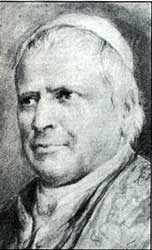
ON the death of Gregory XVI, the whole peninsula was in commotion. For a time it seemed impossible that the conclave should meet in peace. Rome was in an uproar. The provinces were on the verge of revolt. Austrian troops crossed the frontier to preserve order.
An Austrian fleet appeared at Ancona. In the diplomatic circle there was unusual activity. The character and policy of the Pope now to be chosen portended much to the secular governments outside of Italy; most of all, it was thought, to Austria and to France.
Austria wished for a Pope of uncompromising disposition and absolutist tendencies. France earnestly desired a man of liberal and popular opinions, who sympathized with the aspiration for progress and the clamor for administrative reforms.
The candidate of the Austrian party was Cardinal Lambruschini, Gregory’s secretary of state. The favorites of the populace were Cardinal Gizzi and Cardinal Micara, neither of whom, however, had more than one or two supporters in the Sacred College.
The party which, for want of a more appropriate term, may be called that of the moderate liberals placed its hopes in Cardinal Mastai-Ferretti, and all the influence of France was thrown in his favor. The multitude of Romans knew little or nothing about him, for he seldom went to Rome. But among the cardinals his disapproval of some of the political measures of the preceding reign was no secret, and his amiable and saintly character was certainly understood.
When, therefore, the French ambassador, Count Rossi, pressed his name upon the members of the Sacred College, the suggestion met with much favor.
How much effect the representations of the ambassador really may have had we can only conjecture, but in the election of Pius IX the French Government certainly believed that it had gained a diplomatic victory. ‘ All the world congratulates us,’ wrote Rossi to M. Guizot as soon as the new Pope was proclaimed, ‘on a choice conformable with our views.’
It was on the 14th of June that the cardinals entered their cells in the Quirinal, the doors were closed, and the guards were posted.
In the conclave of 1846 there were fifty- four cardinals present, and the number of votes necessary to elect was consequently thirty-six. The first ballot took place on the morning of the i5th, and the suffrages of the college were found to be scattered among no fewer than twenty-two candidates.
But only two of these really commanded a party. Cardinal Lambruschini [and] Cardinal Mastai. [As ballots in the conclave proceeded, it became ever clearer that Lambruschini was losing support and Cardinal Mastai gaining.]
A New Pope is Elected

Cardinal Mastai meanwhile retired to his cell and spent the hours in prayer. He came to the afternoon session pale and trembling. He was one of the three tellers appointed to open the ballots.
When they were taken from the chalice he read his own name on the first, on the second, on the third on every paper up to the eighteenth. He could not go on; he begged in vain that an other might finish the task.
The cardinals gathered around him, and for some time he sat terrified and almost insensible, while tears streamed down his cheeks. On the completion of the [ballot he had won]. Then the whole assembly rose to confirm the choice by unanimous acclamation.
It is said that he prayed and insisted that the cardinals should remove that cup from his lips; but they would not annul their decision. He fell upon his knees before the altar, and in the midst of profound silence communed for a while with God.
Then the junior cardinal-deacon struck a bell. The master of ceremonies, the secretary of the Sacred College, and the sacristan entered the chapel.
The cardinal-camerlengo and the three cardinal-heads of orders approached the new Pope and asked of him: Acceptasne dectionc in de te canonice factani in Suminutn Pontificem? ‘Do you accept your canonical election as Supreme Pontiff?’
As he signified assent the canopies erected over the seats of the fifty-three remaining cardinals suddenly drop ped, and his alone was left erect. The cardinal-dean drew near, and enquired what name he chose to assume.
He took the name of his first protector, Pius VII. Then the master of ceremonies led him to the sacristy, where three full -suits of pontifical vestments, of various sizes, had been prepared in advance; and selecting the set which corresponded with his stature, Pius IX put on the white cassock and cap, returned to the altar, gave his first apostolic benediction, and took his seat on the throne to receive the homage of the conclave.
That night he wrote the following letter to his brothers at Sinigaglia :
ROME, June 16, at three-quarters past ii P.M. ‘ DEAR BROTHERS JOSEPH, GABRIEL, and GAETANO :
The blessed God, who abases and raises up accord ing to his divine will, has thought fit to lift up my low liness to the most sublime dignity of this world. Hij; holy will be always done. I know the awful weight of so great a charge, and I know likewise the insufficiency, the utter nullity, of my own strength.
Have prayers said for me, and pray for me yourselves. The conclave lasted forty-eight hours. If the municipality should think fit to go to any expense in celebrating this event, contrive indeed, it is my will to have the whole sum spent on something profitable to the city, according to the directions of the mayor and council. As to yourselves, dear brothers, I embrace you with all my heart in Jesus Christ; far from exulting, pity your brother, who gives to all of you the apostolic benediction.
Pius PP. IX
It was on the following morning, June 17, that according to custom the bricked-up window in front of the Quirinal was opened, and the cardinals came out upon the balcony to announce their choice.
Already it was known throughout the city that an election had taken place, for after every unsuccessful scrutiny the ballots are burned with a little damp straw, and the smoke, issuing from a certain chimney, informs the crowd watching outside, that no choice has been made.
At the appointed hour on the last evening there was no smoke, and the populace crowded betimes next day to the noble square before the palace. ‘ The piazza of the Quirinal,’ wrote an English eye- witness:*
presented a magnificent coup-d ceil. The sky was most beautiful, the piazza crowded with people, the troops drawn up in array, and all with their faces turned towards the balcony. At nine were heard the blows of ham mers breaking down a window that is ordinarily built up. Shortly after the cardinal-camerlengo appeared with the bearer of the crucifix, and announced to the people the exaltation to the Papacy of the cardinal, who took the name of Pius IX The populace responded with shouts of joy.’
‘I bring you a message of great joy’ so ran the formula of declaration:
We have a Pope, the most eminent and most reverend Giovanni Maria Mastai- Ferretti, who has taken the name of Pius IX.
Then, while the cannon of the Castle of St. Angelo thundered a salute and acclamations rent the air, the white-robed figure appeared in the midst of the brilliant throng on the balcony, and raised his hand in that gesture of benediction which all who ever saw him will long associate with his memory.
First Days of Pius IX
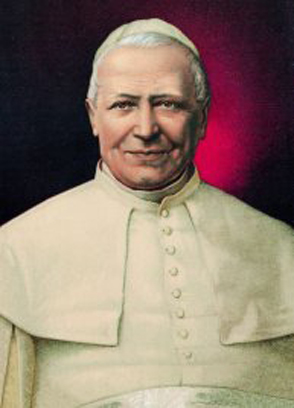
The story of his first days in the pontificate reads like a charming romance. His accession was celebrated according to custom by profuse benefactions to the poor.
Fifty-three young girls in Rome and the suburban parishes received dowries of fifty-three crowns each.*
A thousand in the provinces received dowries of ten crowns. Six thousand crowns were distributed in alms.
All articles pawned by the poor in the government Mont de-Piete were redeemed; and all the debtors confined at the Capitol were released at the Pontiff’s expense.
He called the steward of the palace and said to him: ‘ When I was bishop I spent for my per sonal expenses a crown a day; when I was cardi nal I spent a crown and a half; and now that I am Pope you must not go beyond two crowns.’
Before his time it was usual in summer to have a variety of water-ices and other light refreshments always in readiness at the palace, and one day, when he asked for a little orangeade, a lackey quickly appeared with an array of pastry and ices of various sorts.
Displeased at this wasteful custom, of which he had never heard before, the Pope sent away the tray, and, calling for a knife and an orange, prepared the drink himself. He forbade any repetition of the pastry-cook’s extravagance.
His tastes and habits were extremely simple. He liked to walk the streets without attendants, and to speak with all who had anything to ask of him, especially with the poor. He visited the hos pitals, unannounced, to see how they were admin istered and to talk with the patients.
He entered the schools, and delighted the children by distributing the prizes at the examinations. Often when the little ones were to receive their First Commu nion he appeared without warning in the sanctuary, and administered the sacred Host with his own hands.
Children loved him instinctively, and approached him without fear. He was leaving a church one day when a boy marched up to him, and said : ‘Are you the Pope?’
‘Yes, my little friend.’
‘I have no father.’
‘Then I will be a father to you,’ was the characteristic rejoinder; and after enquiring into the child s history he charged himself with his support and education.
A child wrote to him: ‘ Holy Father, my mother is a widow and sick, and I am too young to take care of her. Jf you do not help me I cannot buy medicine for her. We must have thirty-three pauls; and I will come to the Quirinal tomorrow to ask you for them.’
The Pope ordered that he should be admitted, and, after some questions, gave him a piece of money.
‘That’s three pauls too much,’ said the lad, ‘ and I have no change.’
He was told to keep it, and so dismissed. As his story proved to be true, the Pope sent for him again.
‘ You are a brave lad and a good son,’ said the Holy Father, ‘ and I am going to take care of you for the future.’
‘ Oh! That can’t be,’ answered the boy, ‘because my mother has nobody but me, and I must not leave her.’
‘ Well, then,’ said the Pope, ‘ I shall take care of your mother too.’
One day he met a little fellow on the road outside the walls lugging home a faggot of dry sticks which he had gathered in the neighboring woods.
‘ I hope you have not stolen that, my child,’ said the Pope, ‘ for that would be a sin.’
‘Oh! No, Holy Father.’
‘ Well, what are you going to do with it ?’
‘ I am going to take it home to cook the polenta.’
‘ Would you not rather sell it ?’
‘Why not, if you would like to buy ?’
‘ Very well, take this money, then.’ And the Pope, giving him a piece of silver, went on his way.
The boy looked for a moment in surprise at the large coin, and then ran after the Pontiff, crying : ‘ Hi! Holy Father, where do you want me to carry the faggot?’
A poor market-gardener lost his horse, and walked boldly into the palace to ask the Pope if he could not spare an old one from the Quirinal stables. A secretary found the man on the stairs and took his message to the Holy Father.
‘ Yes,’ was the Pope’s reply; ‘and give him this money, too. He must be very poor, or he would not want one of the Quirinal horses.’
One day a soldier on duty at the palace held out a loaf of army bread as the Pope passed. Pius took it and found it to be bad.
‘Do you always get bread like this ?’ he asked.
‘Always, Holy Father.’
‘Well, we will look to it.’
The next day the Pope examined the bread again, and the day after the military purveyor was in prison.
Disguised in lay costume, he entered a hospital, and found a patient dying and the chaplain ab sent. He placed himself by the bed of the sick man, heard his confession, and administered the last sacraments; and the chaplain was promptly dismissed.
In disguise, also, he visited the prisons to detect abuses, and the convents to test the strictness of the religious observance. One even ing, rather late, a stranger in a cloak knocked at the gate of a certain monastery and asked for the prior.
‘Is this a time of night,’ cried the porter through the grate, ‘ to come knocking at the door of a con vent? Go away. The prior is in bed and the community is asleep. You can come back in the morning.’
But the visitor insisted: ‘Tell the prior that Brother Mastai wishes to see him.’
‘Brother Mastai! And who is Brother Mastai. I should like to know?’
Here’s a dreadful thought came to the porter: Mastai was the name of the Pope; trembling, he opened the door and recognized his illustrious guest. Pius inspected the convent and ordered the community to be assembled.
Two of the monks were missing; in violation of the rule they were passing the night outside, and the prior explained that they allowed themselves this irregularity on account of the hot weather.
‘The rule is for summer as well as winter,’ said the Pope; and then he addressed to the superior a severe reprimand. The next day the two truant monks were ordered to a house of ecclesiastical correction.
He set himself at once to correct laxity in religious establishments, renew the strictness of conventual life, and revive the spirit of self-abnegation, simplicity, and piety which distinguished the primitive monastic foundations.
He knew that negligence rather than actual corruption was the great danger which monks had to dread, and to keep their zeal always fresh he established a new congregation of cardinals for the supervision of the religious orders.
He showed a deep and special concern for the spiritual welfare of all priests charged with the care of souls. A few months after his election he assembled at the Quirinal the preachers appointed for the coming Lent in Rome.
‘The Secret of Your Strength is in Your Love’
‘Do not forget,’ said he, ‘that the secret of your strength is in your love; if you do not love men, if your hearts are not filled with affection and devotion, you will have no influence upon them. Watch over your own conduct. Be severe to yourselves, and do not let the faithful say of you, as subjects under a despotism say of their rulers, ‘ Our masters keep all the rights for themselves and leave us nothing but the duties. ‘
Conversing one day with the celebrated preacher, Father Ventura, who had been his classmate in boyhood and his close friend in later years, he complained bitterly of the prevalence of profan ity among the working classes. ‘Why do you not thunder from the pulpit against this deplorable practice?’
‘ Holy Father,’ replied the preacher, ‘I have done so many a time, but to no avail.’
‘Well, then, I suppose I ought to try my turn,’ said the Pope; ‘ but it is so long since any pontiff has been seen in the pulpit, and I have so little eloquence, that I am afraid of offering only a vain spectacle of which the people will not profit.’
‘Your Holiness is mistaken. The attachment of the people to your person is at least a pledge that they will listen attentively to your words.’
‘So be it. You are to preach on the 13th of January at S. Andrea della Valle; give up your place to me, and keep the secret.’
On the appointed day indescribable was the wonder of the immense audience collected to hear Father Ventura when they saw the Sovereign Pontiff ascend the pulpit.
It was so many ages since a Pope had preached that the innovation created an excitement all over Rome, and, whatever the practical effect of the sermon may have been, it was certainly listened to with breathless attention.
A Roman noble, displeased with his two sons, left all his fortune by will to the priest who should say the first Mass in his parish church, on the morning of the funeral. The Pope, informed of this unjust testament, said the Mass himself, and having obtained the fortune, divided it between the right ful heirs.
One of the Pope’s nephews came to Rome after the election, expecting to obtain the title of count. Pius sent him back to Sinigaglia, and bade him warn the family not to look for preferment merely because they were related to the Pontiff.
Another nephew was an officer in the army, and to him Pius announced that he must hope for promotion only as he earned it by merit and length of service.
The modest scale of his private expenditures, and the abolition of various abuses and extravagances in the administration of the palace, enabled him to enlarge Ins charities, and there was not a corner of Rome into which his beneficence did not bring happiness.
A Pope of Action for the Poor
Nor was it only by the comparatively easy method of reckless almsgiving that he sought to relieve distress.
He tried to help the poor most of all by finding work for them and stimulating commerce and manufactures.
He broke up many burdensome monopolies. He introduced railways. He opened ports of entry. He established iron works. He encouraged the formation of agricultural societies and the reclaiming of waste lands. He founded free lodging-houses for the poor, and reading-rooms, and mechanics clubs, and training- schools for artisans.
He showed the utmost charity and tenderness to the oppressed Jews; set aside an annual sum for the relief of their poor; gave money for the repair of their synagogue; allowed them to elect a high-priest after they had been twelve years without one; and broke down for ever the barrier that confined them to the Ghetto so long the reproach of a tyrannous Christian civilisation.
A terrible inundation of the Tiber, by which the Jews were the greatest sufferers, happened in the first year of his pontificate.
‘ This disastrous calamity,’ says the Protestant Mr. Legge:
Only supplied the Pope with an opportunity for displaying afresh his Christian benevolence and his generous devotion to the temporal as well as spiritual well-being of his people.
Ungrudgingly, and with splendid munificence, he contributed to aid the unhappy victims of this disaster, forestalling the demand for redress and the commotion with which in all probability it would have been attended.
When Pius IX was proclaimed from the balcony of the Quirinal, the populace, ignorant of this Cardinal Mastai-Ferretti, and disappointed, perhaps, in a hope of the election of Gizzi, looked at him with some doubt. But long before the end of the year they had conceived for him a true, deep, enthusiastic affection which no political changes and excitements in after-time could ever wholly remove from their hearts.
While the personal character of the new Pontiff captivated the Roman multitude, the earliest indications of his public policy filled Italy with enthusiasm.
One of his first acts was to declare an amnesty for all political offences, and a characteristic anecdote is told of him in connection with it. He called a council of his principal advisers, and asked their votes upon the proposed measure of mercy.
To his chagrin, a majority of the balls voted were black. He took off his white cap and placed it over them. ‘ Now,’ said he, ‘ they are all white.’
The prisons were opened. The exiles returned. One thousand six hundred persons were restored to freedom and friends. The concession of an amnesty, under restrictions, was a common enough act of a new papal government, but never before had a pardon been granted so sweeping and so complete.
None were excepted from its provisions, save a very few ‘ecclesiastics, military officers, and civil servants ‘ whose cases were reserved for especial examination; and no conditions were imposed upon the pardoned, except that they should promise in writing ‘ never to abuse this favor,’ and ‘ to fulfil all the duties of good subjects.’
Rome was in a tumult of joy. Veteran conspirators threw themselves at the Pope s feet. Some of those who were afterwards the most active in the overthrow of his government were the first to pledge their eternal fidelity. The populace thronged about him whenever he went abroad, cast flowers in his path, waited for hours before the palace windows to get his blessing.
On the feast of St. Peter’s Chains a great number of the pardoned received communion from the Holy Father’s hands. The demonstrations of rejoicing reached an unheard-of extravagance.
It was almost a continual holiday in Rome, with gay processions by day and torchlight parades by night, public banquets in the vineyards and gardens, triumphal arches spanning the streets, the papal colors white and yellow fluttering from every window and decorating every breast.
The work of administrative reform was pushed with the utmost activity, and the Pope gave his personal care to the details of almost every de partment of the government. He improved the finances, reduced the taxes, abolished sinecures, cut down the expenditures, reorganized the courts of law.
The French ambassador, Count Rossi, writing to M. Guizot, gave an interesting account of an unofficial conversation with the Pope respecting the correction of abuses.
‘This is what I can and ought to do,’ said Pius, after explaining his plans. ‘ A Pope has no business to plunge into Utopian schemes. Would you believe it? There are people who speak of an Italian league with the Pope at its head. As if such a thing were possible! Those are chimeras.’
‘ Besides,’ replied the count, ‘Your Holiness has other matters with which to occupy yourself. You have traced the route you have to follow, and better results will ensue; the end of abuses, which I fear are numerous, and the introduction of regularity and order such, I think, is the wish of your Holiness.’
‘You are right,’ said the Pope; ‘Such is my purpose. I must, in the first place, re-establish our finances; but I require a little time.’
‘No one,’ answered Rossi, ‘expects from your Holiness precipitate measures; the essential point is to let it be known that they are in active operation. The confidence of the public is entirely attained; they will wait with gratitude and respect.’
The organization of the new government was a matter of some difficulty. All the cardinals perceived the necessity of reform, but there were great differences of opinion as to the particular measures which could be safely adopted.
The Pope was hard pressed likewise by exterior forces by Austria on the one hand, and the intrigues of Piedmont, the plots of the Mazzinians, and the precipitation of the Roman people on the other.
His own resolution, however, was taken promptly, and he held to it without wavering. For the first few weeks of his reign he called to his aid in the administration a temporary commission of six cardinals, among whom were the foremost representatives of both parties the popular Gizzi and the unpopular Lambruschini.
But in August Cardinal Gizzi was appointed Secretary of State, and the enthusiasm of the populace rose higher and higher. The cere mony of taking possession of the church of St. John Lateran, on the 8th of November, called out extraordinary demonstrations of rejoicing.
‘The spectacle is most imposing,’ writes an English observer:
But on this occasion the shouts of thousands of grateful people gave a life to the ceremony without which it had been cold, and of the vast multitude assembled every individual ex hibited the joy of his heart. The Pope raised him self and stood upright for some minutes, the triple crown on his head; this was the signal for fresh acclamations. He gave the blessing, waving his hand in the form of a cross. A burst of enthusiasm followed; the cannon thundered, the music sounded, drums, trumpets, and pealing of bells joined with the people in one mighty chorus, and the pageant was over.
Against the Secret Societies
Yet how little the Pope was affected by the intoxication of flattery and the shouts of the multitude, and how well he understood the hidden forces which were even then undermining his throne, appeared in his first encyclical letter, published the day after this splendid celebration.
He censured, in severe terms, the secret societies:
which emerge from their native darkness for the ruin and desolation of the community’; the ** guilty fellowship ‘ of men ‘ who drag to light the most monstrous shapes of error’; ‘the haters of truth, the skilful artificers of fraud, who labor to extinguish in men s minds every impulse of piety, jus tice, and honor, to corrupt morals, to confound all ideas of divine and human right, and to overturn the foundations of the Catholic religion and of civil society.
He condemned the opinion that:
The progress and development which mark the course of human affairs can prevail also in the Catholic religion, the perfect work of God, not to be improved by the genius of man.
He denounced the dangerous tendencies of the:
Bible societies, which obtrude upon all kinds of people copies of the Sacred Scriptures translated into living languages, and accompanied frequently with perverse and erroneous interpretations, to the end that every man, setting aside the authority of the Church, may interpret the revealed word of Almighty God in conformity with his private judgment.’
Thus, at the very beginning of his reign, the Sovereign Pontiff defined, with clear and positive voice, the same irreconcilable hostility of Catholic teaching to the fallacies of modern liberalism which he stated a quarter of a century later in a still more celebrated encyclical.
A Liberal Pope?
Naturally, the letter of November, 1846, made a profound impression throughout Europe, and caused no little irritation among Protestants, who had cherished wild and absurd ideas of the ‘ reforming Pope’.
But whatever momentary disappointment may have followed this invigorating de claration of the papal authority was soon effaced by the effect of his political policy. The censorship of the press [typical throughout much of Europe at the time – RB] was relaxed. The governors of provinces were instructed to call together the most influential laymen within their jurisdiction, and consider with them the reforms most urgently needed.
A Consulta of State was organized, composed of lay deputies from the provinces, who were to assemble in Rome:
To assist the Pope in the administration, and to give their opinion on matters of government connected with the general interests of the state and those of the provinces, on the preparation, amend ment, and execution of the laws, on the creation and redemption of public debts, on the imposition or reduction of taxes, on the tariff and the budget, on the revision and reform of the organization of local councils, etc.’
A council of ministers was formed at the same time, with Cardinal Gizzi at the head, and Antonelli, who enjoyed great popularity at that time, in charge of the portfolio of finance.
A little later a municipal government was granted to the city of Rome, with a council of one hundred members, and an upper chamber composed of a ‘senator ‘ and eight ‘conservators ‘ chosen by the council from its own members.
Negotiations were opened with other Italian states for the establishment of a customs union, intended to be the basis of a still more intimate confederation. The most important of the new measures, however, was the formation in Rome of a Civic Guard, or volunteer militia, which, of all popular institutions, is the most thoroughly incompatible with an absolute personal government.
The public rejoicings at this manifes tation of the Pope s confidence in his people would be thought extravagant, if we did not know the sen timent which lay behind the noisy demonstrations of gratitude.
The young men who hastened to don a showy uniform and devote themselves to exercises of arms were not merely enamored of military life and proud of their unaccustomed honors and responsibilities, but they were burning with the warlike fever which was soon to precipitate the revolution; and to many of them the enrollment of the Civic Guard meant only a long step towards the expulsion of the Austrians.
Meanwhile, this steady, careful, and voluntary progress of the Pope towards constitutional forms was watched by the world with diverse feelings.
The animosity of Austria was not concealed. Several of the Italian states united in a note to the Austrian Government, calling attention to what they called the dangerous policy of the Pope, and Austria not only remonstrated with the Roman court, but plotted incessantly to defeat the Holy Father’s benevolent purposes.
France, on the contrary, gave Pius a frank and generous support … Eulogies were pronounced in the British House of Commons.
Even Mazzini, true, to the policy already explained, wrote to the Pope in September, 1847:
Holy Father, I watch your progress with immense hopes. Be confident, trust in us, and we will found for you a government unique in Europe. We know how to convert into an active force the instinct with which Italy is now quivering from end to end; we can raise up support for you in the midst of all the peoples of Europe, and find friends for you even in the ranks of the Austrians.
We alone can do this, because we are united in our aim and have faith in the truth of our principle. I write to you because I believe you worthy to initiate this grand enterprise.’
M. Guizot addressed a note to the French repre sentatives at the European courts, announcing the desire of France that in all countries the necessary reforms should be accomplished regularly, progres sively, and by consent between the governments and peoples, and pointing to Pius IX as an example of a wise and patriotic ruler.
‘ The Pope,’ said he, ‘ in the great work of reform he has under taken, displays a deep sense of his dignity as Head of the Catholic Church and of his rights as a sove reign, and shows himself equally determined to maintain them within and without his states.’
* Italy in the Nineteenth Century. By the Rt. Hon. James Whiteside, M.P.
Buying Books at Amazon Through These Links Gives Us a Commission. This Supports Our Apostolate. Thank You if You Can Help Us Like This!


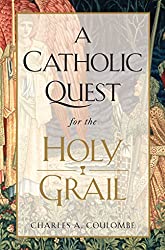
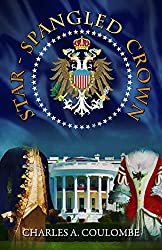
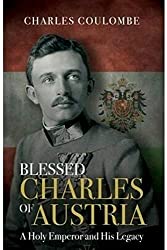
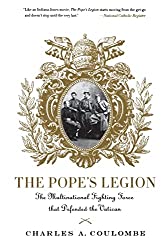
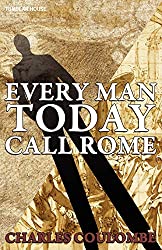
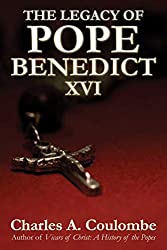
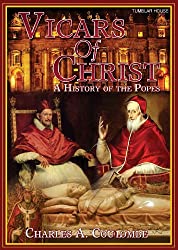
Comments
comments are currently closed
5 responses to “Life of Pope Pius IX – Ch 3: The Conclave Elects a New Pope”
[…] Life of Pope Pius IX – Ch 3: The Conclave Elects a New Pope […]
[…] Life of Pope Pius IX – Ch 3: The Conclave Elects a New Pope […]
[…] « Life of Pope Pius IX Ch 1: Early Years in Christendom Despoiled Life of Pope Pius IX – Ch 3: The Conclave Elects a New Pope » […]
[…] « Life of Pope Pius IX – Ch 3: The Conclave Elects a New Pope Life of Pope Pius IX – Ch 5: On the Annexation of the Papal States, Dogma of the Immaculate Conception and More » […]
[…] Life of Pope Pius IX – Ch 3: The Conclave Elects a New Pope […]